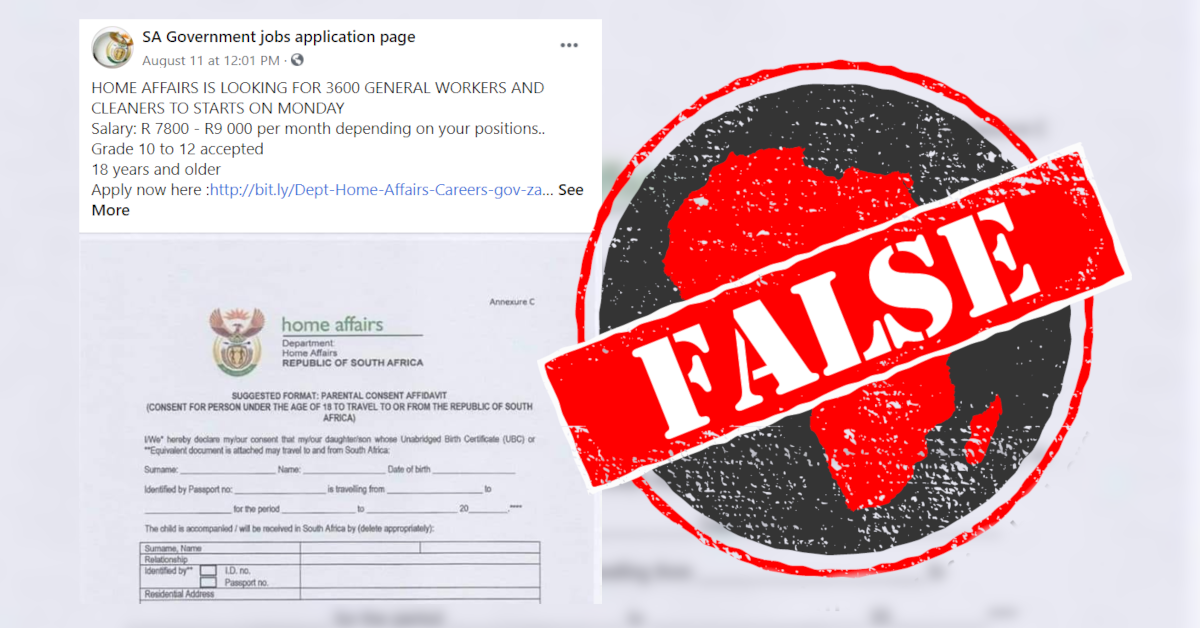On Facebook, the “SA Government jobs application page” offers jobs at South African government departments such as home affairs, correctional services and road traffic.
Applicants are offered R6,000 to R9,000 a month and only need a grade 12 qualification to apply for the jobs. To get ahead of the job queue, all they need to do is share the job post, or comment on the post, to express their interest.
Sounds too good to be true? That’s because it is. The Facebook page is a scam.

The posts on the page are also suspicious. Facebook users are asked to share and comment, sometimes with their personal details – such as the province they live in.
This is an example of engagement bait – posts that ask people to interact by liking, commenting or sharing. The more people do this, the greater the Facebook page’s reach.
Some posts include a link that can supposedly be used to apply for a job online but these are all dead ends. Instead of being taken to a legitimate employment website, you are taken to an unrelated, basic-looking website, full of pop-up ads and colourful banners. The owner of the website is likely earning money from views and clicks.
Similar tactics have been employed by other Facebook pages claiming to advertise jobs. You can read our in-depth investigation here. Our guide to Facebook scams and how to spot them can also arm you with the tools you need to avoid being duped in the future.
Applicants are offered R6,000 to R9,000 a month and only need a grade 12 qualification to apply for the jobs. To get ahead of the job queue, all they need to do is share the job post, or comment on the post, to express their interest.
Sounds too good to be true? That’s because it is. The Facebook page is a scam.

No link to South African government websites or social media
Facebook transparency records show the page was created in July 2020. It has no links to any of the South African government’s official websites or verified social media accounts.The posts on the page are also suspicious. Facebook users are asked to share and comment, sometimes with their personal details – such as the province they live in.
This is an example of engagement bait – posts that ask people to interact by liking, commenting or sharing. The more people do this, the greater the Facebook page’s reach.
Some posts include a link that can supposedly be used to apply for a job online but these are all dead ends. Instead of being taken to a legitimate employment website, you are taken to an unrelated, basic-looking website, full of pop-up ads and colourful banners. The owner of the website is likely earning money from views and clicks.
Similar tactics have been employed by other Facebook pages claiming to advertise jobs. You can read our in-depth investigation here. Our guide to Facebook scams and how to spot them can also arm you with the tools you need to avoid being duped in the future.
Republish our content for free
For publishers: what to do if your post is rated false
A fact-checker has rated your Facebook or Instagram post as “false”, “altered”, “partly false” or “missing context”. This could have serious consequences. What do you do?
Click on our guide for the steps you should follow.
Publishers guideAfrica Check teams up with Facebook
Africa Check is a partner in Meta's third-party fact-checking programme to help stop the spread of false information on social media.
The content we rate as “false” will be downgraded on Facebook and Instagram. This means fewer people will see it.
You can also help identify false information on Facebook. This guide explains how.


Add new comment